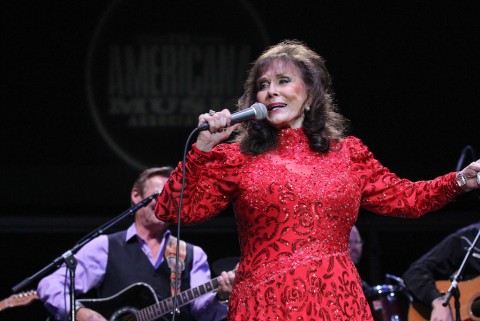
NEW YORK - Loretta Lynn, America's groundbreaking country titan whose frank lyricism delving into women's experiences with sex, infidelity and pregnancy touched the nerve of a nation, has died. She was 90 years old.
She "passed peacefully in her sleep" at her ranch in Tennessee Tuesday morning, her family said in a statement sent to AFP.
Lynn saw a number of her edgy tracks banned by country music stations, but over the course of more than six decades in the business, she became a standard-bearer of the genre and its most decorated female artist ever.
Born Loretta Webb on 14 April 1932 in small-town Kentucky, Lynn was the eldest daughter in an impoverished family of eight kids, a childhood she immortalized in her iconic track "Coal Miner's Daughter" -- a staple on lists of all-time best songs.
"We were poor but we had love / That's the one thing that daddy made sure of," Lynn sang in the hit recorded in 1970 -- later the theme song for a 1980 movie about her life starring Sissy Spacek, who won an Oscar for the role.
At just 15 the artist married Oliver Vanetta Lynn, who she remained married to for nearly 50 years until his death in 1996.
They moved to a logging community in Washington state, and Lynn gave birth to four children before the age of 20, adding twins to the family not long after.
An admirer of his wife's voice, her husband bought Lynn a guitar in the early 1950s.
The self-taught musician went on to pen lyrics inspired by her own early experiences as a married woman and her oft-tumultuous relationship, the nascent days of a prolific career that would see the artist release dozens of albums.
She started her own band, Loretta and the Trailblazers, and began playing bar sets before cutting her first record -- "I'm a Honky Tonk Girl" in 1960.
Her twang was warm and languid but Lynn's lyrics were anything but: she sang with searing precision of marriage's growing pains and gave voice to issues facing women that had long been kept quiet.
"Most songwriters tended to write about falling in love, breaking up and being alone, things like that," Lynn told The Wall Street Journal in 2016. "The female view I wrote about was new."
"I just wrote about what I knew, and what I knew usually involved something that somebody did to me."
During her early years in the industry, she found a friend and mentor in Patsy Cline, one of the 20th century's most influential singers who died in a plane crash in 1963 at age 30.
She also forged a longstanding creative partnership with Conway Twitty, with whom she formed one of country's classic duet acts.
Lynn released a steady stream of hit singles, including 1966's "Dear Uncle Sam" -- one of the era's first tracks to document the tragedy of the Vietnam War.
That same year she put out "You Ain't Woman Enough (To Take My Man)," which made her the first woman in country to pen a number one hit.
In 1969, she released one of her most controversial songs, "Wings Upon Your Horns," which describes through religious metaphor a teenager losing her virginity.
But her runaway success continued and she dominated the 1970s with hits such as "Fist City" -- a stern warning to her cheating husband's lover -- and 1972's "Rated X," which triggered an outcry in discussing the stigmas faced by divorced women.
In 1975, she released "The Pill," which praised the freedoms of birth control.
"When I'd put out a record, they'd say, 'Uh oh, another dirty song.' 'Rated X'? They thought that was going to be bad. But hey, it sold. 'One's on the Way'? They thought that song would really be dirty," she told Billboard in 2015.
"But everything I sang about was everyday living."
In 1988, Lynn was inducted into the Country Music Hall of Fame as one of its most storied legends.
She won virtually every arts honour available, including the prestigious Presidential Medal of Freedom.

